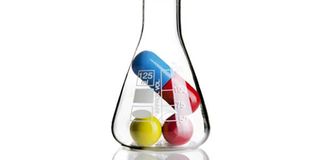Report any adverse drug reactions to authorities

In the course of our lives, it is likely that we will need to take medicines. These include vaccines that prevent illness or prescription medicines that treat serious ailments. PHOTO | FILE
What you need to know:
- When a drug reaction is suspected, the doctor will investigate whether the particular drug is known to cause such a reaction, rule out other alternative explanations, and establish the link between the time the reaction occurred and when the medicines was administered.
- Dose-related adverse drug reactions, which represent an exaggeration of the drug’s therapeutic effects. For example, a diabetic patient may develop weakness, sweating, nausea, and palpitations if insulin or an oral antidiabetic drug reduces the blood sugar level too much.
- Some adverse drug reactions are not related to the drug’s therapeutic effect but are usually predictable, because the mechanisms involved are largely understood. For example, stomach irritation and bleeding often occur in people who regularly use aspirin or diclofenac tablets
In the course of our lives, it is likely that we will need to take medicines. These include vaccines that prevent illness or prescription medicines that treat serious ailments. Some of us may also take over-the-counter (OTC) medicines to treat minor symptoms like headaches as well as dietary supplements such as vitamins.
Medicines can help us live longer and healthier lives by curing illnesses or diseases as well as preventing some conditions from developing.
Most of us will not experience any problems when using medicines. However, all medicines have some risks and a small number of people may develop unwanted effects (also known as adverse reactions).
An adverse reaction is formally defined as a ‘response to a medicinal product which is unwanted and unintended’. This definition includes any harm associated with the use of a medicine, including overdose, misuse or error.
A side effect is different from an adverse drug reaction because it is generally expected when taking medicines. It can be mild and you can continue taking the medicine. However, some people may experience adverse drug reactions and may need a change in their medicines or, in rare cases, additional medical treatment or stoppage of the therapy altogether.
Adverse Drug Reactions can be explained in different ways:
Dose-related adverse drug reactions, which represent an exaggeration of the drug’s therapeutic effects. For example, a diabetic patient may develop weakness, sweating, nausea, and palpitations if insulin or an oral antidiabetic drug reduces the blood sugar level too much. This type of adverse drug reaction is usually predictable but sometimes unavoidable. Dose-related reactions are usually not serious but are relatively common.
Allergic drug reactions are not dose-related but need prior exposure to a drug. Allergic reactions develop when the body’s immune system develops an inappropriate reaction to a drug. A subsequent exposure to the drug produces one of several different types of allergic reactions.
Idiosyncratic adverse drug reactions are unpredictable and usually result from mechanisms or cause not currently understood. Examples of such adverse drug reactions include rashes, jaundice, and anemia, a decrease in the white blood cell count, kidney damage and nerve injury that may impair vision or hearing. These reactions tend to be more serious but typically occur in a very small number of people.
Some adverse drug reactions are not related to the drug’s therapeutic effect but are usually predictable, because the mechanisms involved are largely understood. For example, stomach irritation and bleeding often occur in people who regularly use aspirin or diclofenac tablets
When a drug reaction is suspected, the doctor will investigate whether the particular drug is known to cause such a reaction, rule out other alternative explanations, and establish the link between the time the reaction occurred and when the medicines was administered.
Patients can access information on suspected adverse drug reactions from the package leaflet that comes with a medicine. A Section of the leaflet talks about “the possible adverse drug reactions”. Some of the information at times may be written on the package of the medicines. It is really important to read this information. It is also important for patients to talk to their doctor or pharmacist about the possible adverse drug reactions of medicines being recommended to them.
Individuals can suspect an adverse drug reaction whenever there is worsening of an existing condition, or when they develop what seems like a new medical problem while being treated for something else. Whenever one is worried that they may have had a reaction to a medicine, they should contact their doctor or the pharmacist. The health care provider will advise if one needs any medical care. They will also consider if there is need to change the current treatment or need for a different treatment.
In order to minimise chances of occurrences, patients are advised on the importance of following instructions given by their health care providers on the recommended storage, dose and length of time you should take a medicine. Patients should ensure that they inform their health care providers about any other medicines they are taking such as over-the-counter, self-prescribed, prescription and herbal medicines.
******
Patients are encouraged to report suspected Adverse Drug Reactions to their health care providers who will in turn report to the National Pharmacovigilance Centre at the Pharmacy and Poisons Board. They can also report direct to the Pharmacy and Poisons Board by calling 0795 743 049 or sending an email to [email protected]. It is important for patients to report suspected adverse drug reactions because they are in an ideal position to identify the impact of medicines they have taken, particularly on the quality of their life. The patients’ role in reporting adverse drug reactions is a key element in building an improved system of pharmacovigilance.


